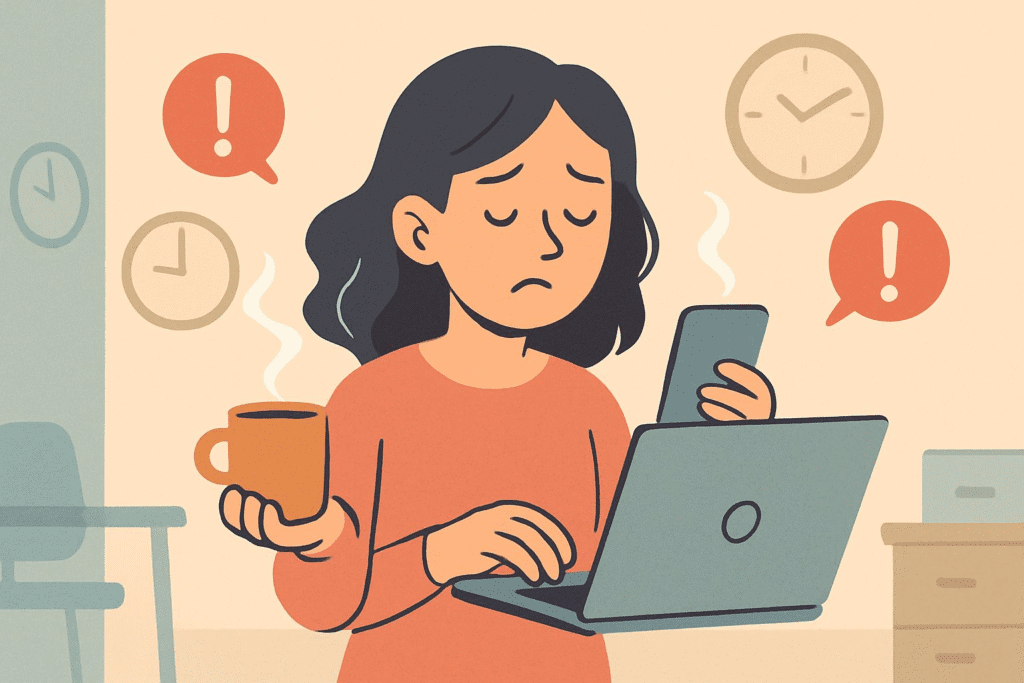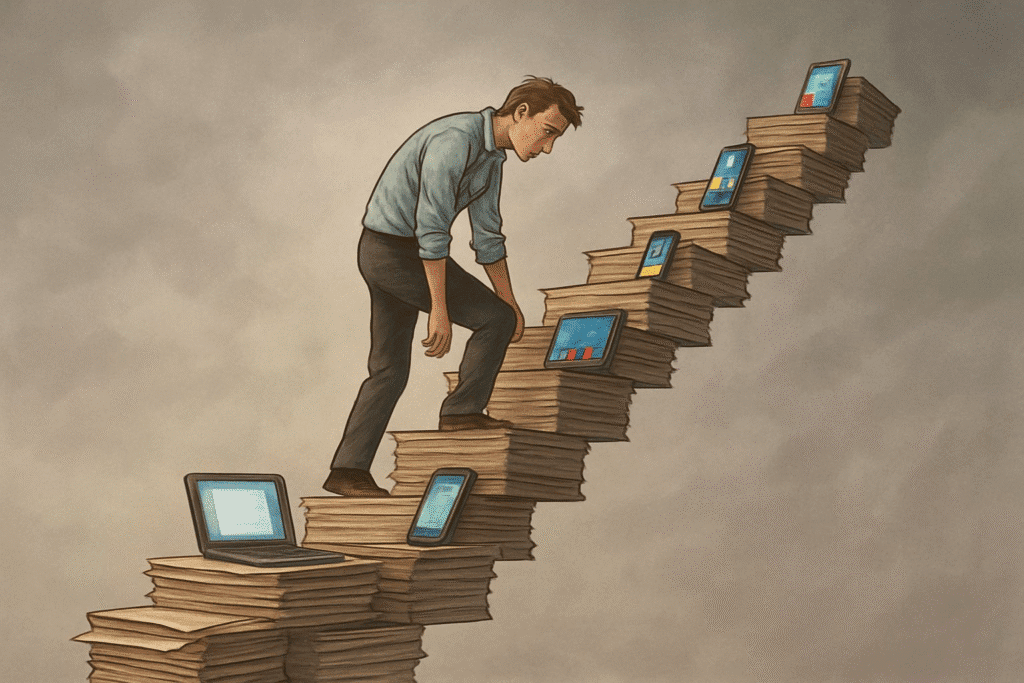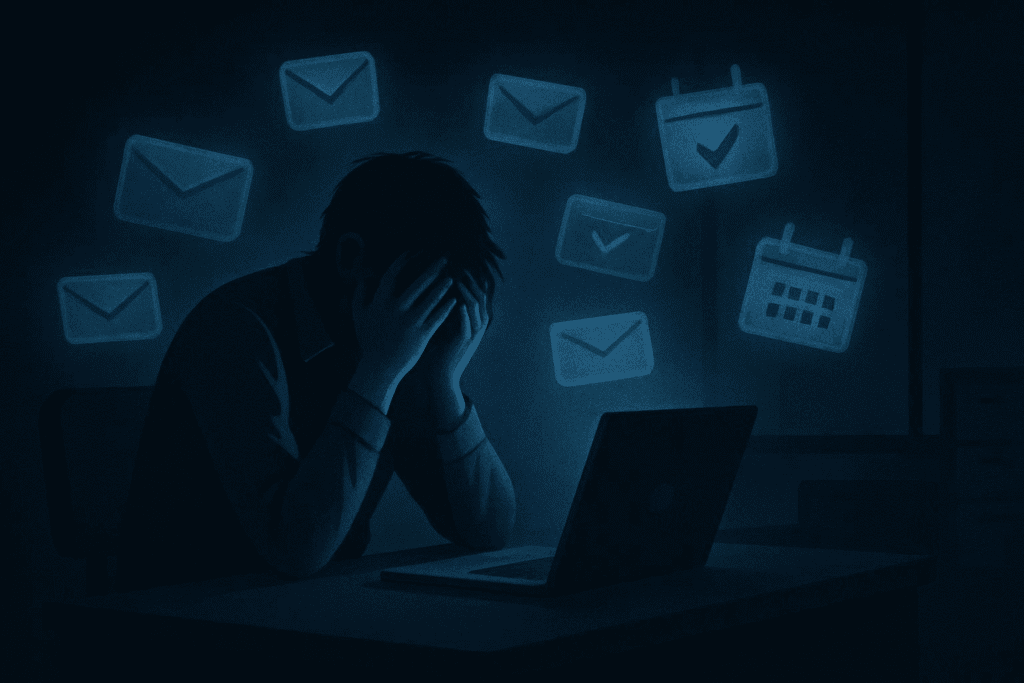Introduction

For the better part of the last decade, hustle culture has been celebrated as the gold standard for achieving success. Popularized through social media mantras like “rise and grind” and “sleep is for the weak”, this mindset painted a picture of success as something earned only through endless work, sleepless nights, and relentless productivity. The promise? Wealth, recognition, and personal fulfillment — if only you pushed yourself hard enough.
But here’s a reality check: hustle culture isn’t a blueprint for success — it’s a recipe for burnout.
Rather than empowering us, this culture has quietly eroded our well-being. Behind the glossy Instagram posts of 4 a.m. work sessions lies a darker truth: chronic stress, anxiety, and a fragile sense of self-worth tied entirely to productivity. The pressure to be in constant motion hasn’t made us more accomplished — it’s left many of us exhausted, disillusioned, and disconnected from what truly matters.
So, it’s time to ask a critical question: Is the hustle really helping us succeed — or is it just wearing us down?
In this blog, we’ll unpack the psychology that fuels hustle culture, reveal the hidden costs that often go unnoticed, and most importantly, explore practical ways to break free from the toxic grind without giving up on meaningful achievement. It’s not about working less — it’s about working smarter, with purpose and balance.
The Psychology Behind Hustle Culture: Why We Can’t Stop Grinding

Hustle culture isn’t just a social trend — it’s a deeply wired psychological cycle that’s hard to break. Beneath the surface of endless to-do lists and late-night work sessions lie powerful mental triggers that keep us hooked on the grind. To truly escape, we need to understand how these forces shape our thoughts and behaviors.
A. The Dopamine Loop of Constant Productivity
Every time we tick off a task or hit a milestone, our brain gives us a little reward: a surge of dopamine, the “feel-good” chemical linked to motivation and pleasure. This hit of dopamine reinforces the connection between doing and feeling accomplished.
Over time, we start craving that rush — not unlike someone chasing the next high. The result? Work begins to feel addictive. We push ourselves harder, not necessarily because we’re making progress toward meaningful goals, but because we’ve become conditioned to seek that fleeting sense of achievement. Unfortunately, this cycle often makes true rest feel uncomfortable or even wrong, as if we’re wasting time.
B. The False Sense of Control
Hustle culture sells us a seductive promise: If you just work hard enough, success is inevitable. This narrative gives us the illusion that we have complete control over our future. But the reality is far more complex.
External factors — like privilege, access to opportunity, timing, and luck — play a major role in shaping outcomes. When we ignore these variables, we fall into the trap of blaming ourselves when things don’t work out, convinced we simply didn’t hustle hard enough. This mindset keeps people locked in toxic productivity, chasing success as if it were only ever a matter of effort.
C. How Social Media Fuels the Hustle Obsession
Scroll through Instagram, LinkedIn, or TikTok, and you’ll see a parade of entrepreneurs, influencers, and “grindset” gurus showing off their 4 a.m. routines, endless work hours, and #NoDaysOff mentality. Social media turns hustle culture into a performance — one that looks glamorous, but rarely shows the toll it takes.
This curated highlight reel makes it easy to fall into comparison traps. We measure our worth against what we see online, and the result is often anxiety, guilt, and the nagging feeling that we’re never doing enough — no matter how much we work.
D. Why Rest Feels Like Failure
In hustle culture, rest isn’t seen as a necessary part of growth — it’s treated as weakness. We’re taught that downtime is a sign of laziness, and so the simple act of taking a break can stir up guilt and self-doubt.
Many people internalize this toxic belief, pushing themselves until burnout hits. What we need, instead, is a radical redefinition of success: one that values balance, mental well-being, and sustainable achievement over non-stop work.
At its core, hustle culture isn’t just about working hard — it’s about control, addiction, and chasing an illusion. Once we understand these psychological forces, we can start breaking free from the cycle and build a healthier, more meaningful relationship with work.
The Hidden Costs of ‘Always Grinding’: What Hustle Culture Doesn’t Tell You
Hustle culture sells us a dream — that if we just work harder and longer, success is guaranteed. But what often goes unspoken are the steep, invisible costs of this relentless grind. Behind every “no days off” post is someone paying with their health, happiness, and relationships. Let’s uncover what’s really at stake.
A. Burnout and Chronic Stress: The Hidden Toll on Your Health
When we’re constantly grinding, our bodies and minds live in a state of high alert. The stress hormone cortisol stays elevated, turning what should be short-term pressure into chronic tension. This can lead to serious health issues: fatigue, anxiety, depression, insomnia, and weakened immunity. Research shows that people who overwork are more prone to heart disease, digestive problems, and frequent illness.
What’s worse, burnout doesn’t just rob you of energy — it dulls your thinking. Creativity dries up, decision-making slows, and even simple tasks start to feel overwhelming. Ironically, the harder you push, the less capable you become.
B. Work-Life Imbalance: When Hustle Damages What Matters Most
Hustle culture encourages us to glorify work above all else, but the cost is often our personal lives. Hours meant for family dinners, meaningful conversations, and self-care get swallowed up by endless tasks and late-night emails.
Over time, this imbalance quietly erodes relationships. Friends drift away. Loved ones feel neglected. The loneliness and resentment that build can leave even the most “successful” person feeling empty inside. True success should never come at the expense of connection.
C. The Myth That Suffering Creates Success
One of the most damaging lies of hustle culture is that struggle equals success. We’re told that if we aren’t exhausted, we aren’t working hard enough. But this mindset confuses pain with progress.
In reality, many of the world’s most successful people don’t grind 24/7. They focus on working smarter — setting boundaries, delegating tasks, and building efficient systems. It’s not the endless hours that drive results, but the clarity and intention behind the work.
D. The Productivity Paradox: How Overworking Makes You Less Effective
It feels counterintuitive, but science confirms it: beyond a certain point, more work leads to less output. Studies have found that productivity starts to decline sharply after about 50 hours of work per week. Mistakes become more frequent. Decisions get delayed. Creativity dries up.
What truly fuels achievement isn’t endless hustle — it’s balance. When we rest, reflect, and recharge, we actually get more done in less time, and with far greater impact.
👉 Hustle culture might wear the mask of ambition, but underneath, it’s a fast track to burnout, broken relationships, and diminishing returns. The first step toward real, sustainable success is seeing these hidden costs for what they are — and choosing a better path.
Breaking Free: How to Escape the Toxic Hustle and Build Sustainable Success

Hustle culture thrives on keeping us trapped in a loop: work harder, push more, and feel guilty for ever slowing down. But here’s the truth — you can break free. And when you do, you’ll find that true success comes not from endless hustle, but from working smarter, living with purpose, and protecting your well-being. Let’s explore how.
A. Redefine Success: From Exhaustion to Impact
For too long, we’ve been taught that success is measured in sleepless nights, overfilled calendars, and sheer output. But what if success wasn’t about how much you do — but about what you do, and why?
True success means creating meaningful impact, not just keeping busy. It’s about making steady progress on goals that matter, feeling fulfilled, and maintaining your mental and physical health along the way. When you shift your definition of success, you stop glorifying exhaustion and start valuing purpose.
B. The Power of Rest: Recovery as a Success Strategy
Contrary to what hustle culture tells us, rest isn’t a sign of weakness — it’s the secret weapon of long-term achievers. Sleep, breaks, downtime — these aren’t luxuries; they’re essential tools for peak performance.
Science backs this up. Studies consistently show that people who allow themselves intentional recovery time come back sharper, more creative, and far more effective. If you want to perform at your best, build rest into your routine — unapologetically.
C. Work-Life Integration: Ditching the Myth of Perfect Balance
Let’s be honest — perfect balance between work and life doesn’t exist. Instead, think of it as integration: finding ways for your personal values, relationships, and work ambitions to coexist without constant conflict.
This means letting go of the idea that every day or week will look perfectly “balanced.” Instead, focus on alignment: are you living in a way that reflects what’s truly important to you? When you do, both your work and personal life become more meaningful.
D. Set Boundaries: Protect Your Energy and Focus
One of the most powerful steps you can take is learning to say no. No to tasks that don’t align with your priorities. No to overcommitting out of guilt or fear. No to the idea that busyness equals worth.
Set clear boundaries between work and personal time, and honor them. Create space for rest, hobbies, relationships, and reflection — because these are what fuel creativity, resilience, and genuine success. Remember: rest doesn’t take away from your productivity — it powers it.
✨ Escaping hustle culture isn’t about doing less — it’s about doing what matters, with clarity and purpose. The path to sustainable success lies in strategy, intention, and self-respect — not in endless grinding.
The Future of Work: Life After Hustle Culture

The age of glorified overwork is coming to an end. As burnout rates soar and people reevaluate what truly matters, a powerful shift is reshaping how we define success. The future of work belongs to those who choose intention over exhaustion, and purpose over endless productivity.
Let’s explore what this new era looks like — and why it’s the antidote to hustle culture.
A. The Rise of Anti-Hustle Movements: Why the Grind Is Losing Its Shine
Across the world, younger generations are rewriting the rules of ambition. Movements like “lazy girl jobs” and slow productivity aren’t about laziness — they’re about reclaiming mental health, setting boundaries, and working with intention.
What was once seen as slacking off is now recognized as smart: valuing flexibility, focusing on deep work, and building careers that fit life (not the other way around). Forward-thinking companies are listening — offering mental health days, remote options, flexible hours, and even four-day workweeks.
B. Quality Over Quantity: The New Standard for Productivity
The future workplace is no longer impressed by who stays at their desk the longest. It’s about what gets done — and how thoughtfully it’s done.
Microsoft Japan’s famous four-day workweek trial saw productivity jump by 40%. This isn’t an isolated case. More businesses are learning that fewer hours, when paired with focus and creativity, yield better results than nonstop grind. The shift is clear: sustainable productivity is the new competitive edge.
C. Mental Health as the New Success Metric
Where hustle culture ignored well-being, the future of work puts it at the center. Burnout can no longer be brushed aside — not when over 75% of professionals, especially Millennials and Gen Z, report experiencing it.
Companies that want to thrive are investing in wellness: from therapy stipends and meditation apps to flexible leave policies. The measure of success is changing. It’s not just about profit margins — it’s about how well organizations support the people who power them.
D. A New Ambition: Redefining What It Means to Succeed
Once, ambition was measured by hours worked and tasks completed. Now, the definition is evolving. The most impactful leaders of tomorrow aren’t asking, “How much can I take on?” — they’re asking, “What’s truly worth my time and energy?”
Success today is about making a difference, fostering creativity, and living in alignment with your values. In this new era, work serves life — not the other way around.
🌱 The future of work is here — and it’s leaving hustle culture behind. Balance, purpose, and thoughtful achievement are taking center stage. The question is: are you ready to thrive in this new world?
Bonus: Timeline — The Rise and Fall of Hustle Culture
The story of hustle culture isn’t just about long hours — it’s about how an entire generation got caught in the belief that exhaustion equals success. Here’s how that story unfolded, and why we’re finally writing a new ending.
⏳ 1990s–2000s: The Birth of the Hustle Fantasy
- Corporate culture rewards those who stay late, skip vacations, and put work above all else.
- The rise of Silicon Valley fuels the idea that grinding = greatness, with tech founders glorified for their sleepless hustle.
- Society starts linking self-worth to productivity, with overtime seen as a badge of honor.
2010–2015: Social Media Supercharges the Grind
- Platforms like Instagram and LinkedIn give rise to “grindfluencers”, who turn hustle into a lifestyle brand.
- Motivational quotes, “no days off” mantras, and glamor shots of late-night work sessions flood feeds.
- The dark side? Burnout spreads silently, as people push beyond healthy limits to keep up appearances.
2016–2020: The Wake-Up Call
- Research connects hustle culture to mental health crises, chronic stress, and deteriorating relationships.
- Millennials and Gen Z start questioning the grind, fueling conversations around balance and purpose.
- The term “hustle culture” shifts from inspiring to toxic, as the human cost becomes clear.
2021–2024: The Anti-Hustle Revolution
- “Lazy girl jobs”, remote work, and slow productivity movements gain traction — not out of laziness, but out of the desire for sustainability.
- Companies begin rethinking productivity, offering well-being benefits, mental health days, and flexible schedules.
- The idea that rest is strategic, not weak, enters mainstream career conversations.
2025 and Beyond: Life After Hustle Culture
- Burnout is no longer seen as an individual failure, but as a sign of broken work systems.
- Success is being redefined around impact, balance, and well-being, rather than endless output.
- The future of work belongs to those who work smarter, more intentionally, and in alignment with their values.
💡 This timeline isn’t just history — it’s a reminder that success doesn’t have to come at the cost of your health or happiness. The future is yours to design.
Recommended Reads: Break Free from the Toxic Hustle
If you’re ready to escape the grind and embrace a healthier path to success, these books offer fresh perspectives, actionable strategies, and science-backed insights that go beyond hustle culture.
📘 Pivot to Purpose: Leaving the Toxic Hustle Culture Behind
Kristen Boss unpacks how hustle culture drains your energy and self-worth—and shows you how to build a purpose-driven business or career without burning out.
➡ Best for: Entrepreneurs, freelancers, and anyone seeking balance without losing ambition.
📘 Burnout: The Secret to Unlocking the Stress Cycle
Emily and Amelia Nagoski reveal why stress builds up and how to finally complete the stress cycle so you can protect your health and thrive.
➡ Best for: Anyone struggling with exhaustion, anxiety, or overwhelm.
📘 Essentialism: The Disciplined Pursuit of Less
Greg McKeown helps you ditch the “do everything” trap and focus on what truly matters, so you can achieve more by doing less.
➡ Best for: Professionals wanting clarity, simplicity, and impact.
📘 Rest: Why You Get More Done When You Work Less
Alex Pang explores how deliberate rest fuels creativity, productivity, and resilience—debunking the myth that success comes from constant work.
➡ Best for: High achievers seeking smarter ways to work and recharge.
Conclusion
For far too long, we’ve been sold the idea that success demands sacrifice — that the only way to “make it” is to push harder, sleep less, and never stop hustling. But as more of us are realizing, that path doesn’t lead to fulfillment. It leads to burnout.
🌱 True success isn’t measured by hours worked or exhaustion worn like a badge of honor. It’s measured by the impact we make, the lives we touch, and how well we care for ourselves along the way.
The people shaping the future — the next generation of entrepreneurs, creators, and leaders — aren’t asking, “How much can I grind?” They’re asking, “How can I create, contribute, and succeed without losing myself in the process?”
👉 The future of success belongs to those who:
- Prioritize well-being as much as achievement
- Work with intention, not just intensity
- Redefine ambition as purpose, not endless productivity
FAQ’s
Why is hustle culture called toxic?
Hustle culture makes overworking seem virtuous, pushing people to sacrifice their health, relationships, and mental well-being in pursuit of endless productivity. Over time, this mindset fuels burnout, anxiety, and a sense of never being “enough.”
Does working harder always equal greater success?
No—hard work is only one part of success. Without strategy, rest, and balance, working harder can actually backfire—leading to poor decisions, lower creativity, and exhaustion that hurt your long-term progress.
How can I escape the toxic hustle trap?
✔ Redefine success — Focus on impact, not hours.
✔ Prioritize recovery — Rest is productive.
✔ Set clear boundaries — Protect time for yourself.
✔ Work smarter — Streamline effort for maximum results.
What’s replacing hustle culture today?
We’re seeing the rise of intentional work movements—including slow productivity, work-life integration, flexible careers, and mental health-first policies. Companies are shifting toward sustainability, creativity, and well-being over constant hustle.
Can I still be ambitious without the hustle?
Absolutely! Modern ambition is about smart effort, meaningful goals, and personal fulfillment—not endless grinding. True success comes from balancing achievement with well-being.
